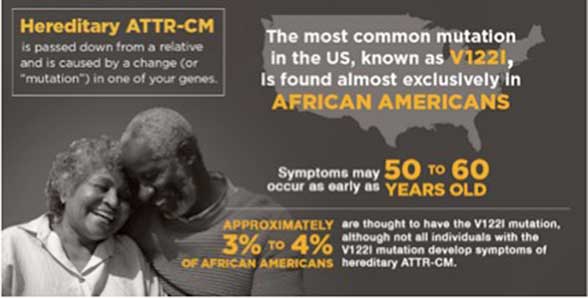
More than a year and a half into a global pandemic that has disproportionately impacted communities of color, we continue to live through a public health tragedy. If there is any hope to be drawn from so much hardship and loss, it’s that COVID-19 has reignited new conversations about disease awareness and the inequality that still exists in our healthcare system.
I’ve witnessed how delayed patient office visits can impact care within our community. It is crucial that we continue to work to raise awareness among both physicians and patients on diseases that disproportionately affect communities of color.
 That’s why there is one condition I want every heart failure patient to be aware of. It’s called transthyretin amyloid cardiomyopathy, or ATTR-CM. ATTR-CM is a serious and often underdiagnosed cause of heart failure.
That’s why there is one condition I want every heart failure patient to be aware of. It’s called transthyretin amyloid cardiomyopathy, or ATTR-CM. ATTR-CM is a serious and often underdiagnosed cause of heart failure.
ATTR-CM is a progressive disease, in which over time the heart muscle begins to thicken and stiffen. There are two types of ATTR-CM; the wild-type, which is associated with aging, and the hereditary type, which is associated with a gene change (mutation) and can be passed down from a relative. The most common mutation in the United States, known as V122I, is found almost exclusively in African Americans. Approximately 3% to 4% of African Americans are thought to have the V122I mutation, although not all individuals with the V122I mutation develop symptoms of hereditary ATTR-CM.
While heart failure is common among Black/African Americans and associated with Afro-Caribbean communities, hereditary ATTR-CM in these populations is often overlooked by doctors for several reasons. In fact, some patients with ATTR-CM say they visited up to five doctors before receiving an accurate diagnosis.
This is why I am excited to be partnering with Pfizer in New Orleans on Voices for the Heart – a community-based initiative bringing together physicians and trusted local organizations within Black/African American and Afro-Caribbean communities around the country to increase awareness of hereditary ATTR-CM as an often-underdiagnosed cause of heart failure.
Early signs of ATTR-CM can include an irregular heartbeat, fatigue, shortness of breath, carpal tunnel syndrome, swelling in the hands and feet, and numbness and tingling in the hands. Some of these symptoms are not traditionally associated with heart disease, which may contribute to multiple doctor’s appointments and a delayed or incorrect diagnosis.
I’m committed to spreading awareness of hereditary ATTR-CM because I have seen firsthand how a delayed diagnosis can adversely impact a patient (and their loved ones), making it essential to inform our community about this condition – including everyone from patients to caregivers to local healthcare providers.
 If you’re experiencing seemingly unrelated signs and symptoms (e.g., irregular heartbeat, fatigue, shortness of breath, or carpal tunnel syndrome), have a family history of cardiac issues, and have been diagnosed with heart failure, talk to your primary care doctor or an experienced cardiologist. Whether they seem related or not, it’s important to share your symptoms and health history. This will allow your doctor to provide the care you need and to make an appropriate diagnosis.
If you’re experiencing seemingly unrelated signs and symptoms (e.g., irregular heartbeat, fatigue, shortness of breath, or carpal tunnel syndrome), have a family history of cardiac issues, and have been diagnosed with heart failure, talk to your primary care doctor or an experienced cardiologist. Whether they seem related or not, it’s important to share your symptoms and health history. This will allow your doctor to provide the care you need and to make an appropriate diagnosis.
Family members and caregivers also have an important role to play because they sometimes notice or remember health symptoms that the patient may forget or neglect to mention, and help people with hereditary ATTR-CM manage their disease. These caregivers, in many cases, might also be the first person who urges, encourages, or facilitates the initial medical evaluation for the patient.
As part of the Voices for the Heart effort, I will be moderating a virtual event hosted by Docs on Da Block on Wednesday, December 15, 2021, to share educational resources and increase awareness about hereditary ATTR-CM with the New Orleans community. To register for the event, click here or visit https://bit.ly/3cfWqgT.
Working together, we can overcome the challenge of low awareness and raise our collective voices to help educate family members, friends, and neighbors at risk of developing hereditary ATTR-CM.
For resources on hereditary ATTR-CM, including a discussion guide to help conversations with your doctor, you can visit http://www.yourheartsmessage.com.
Content developed by Pfizer in collaboration with Russell Ledet, Ph.D. Dr. Ledet is a consultant on Pfizer’s Voices for the Heart program.
Recommended For You.



Be the first to comment